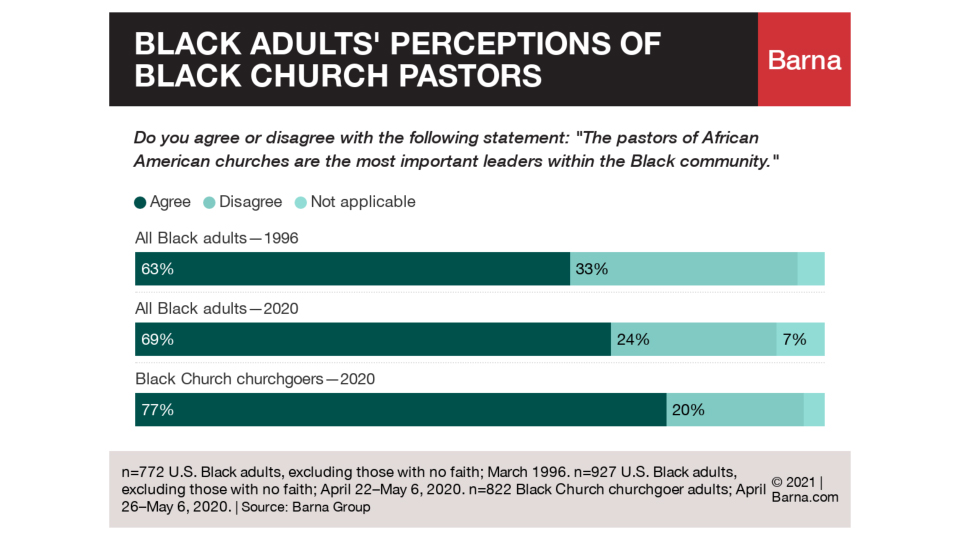This pandemic season has been anything but easy for many leaders and professions, including pastors and church leaders. Until recently, many could not have face-to-face contact with members, particularly the congregation’s aging members, due to COVID-19. However, the release of the vaccine and the CDC’s guidance that those fully vaccinated can visit others who are also vaccinated allows pastors to see and care for their members once again face-to-face.
To be clear, the point here is that being a pastor or church leader has been difficult for different reasons in this season. My friends at Barna Research shared some slides with me about the pastor’s importance in African American churches.

As you can see, the value of the African American pastor is very high. Another part of the study states that many young adults and others who attend African American churches say that the pastor was vital in their decision to join and stay, stating that they cared “a lot” about who would lead them.
All of this made me ask, What is the plan? If we know that the African American pastor is essential in the church context and a reason why people decide to attend the church, how do you protect and ensure the pastor and leadership team’s health? While these numbers list African American pastors, I believe it can apply to many churches and pastors of different backgrounds.
So, what is the plan? Here are some thoughts:
Rest: Every pastor should have a plan for rest during the year at least once, if not a few times. These restful moments can be complete breaks where they leave town or at least weeks when they don’t have to preach that Sunday or the next few Sundays.
Staff: Every pastor will serve better with the right team in place. While I have never pastored, I have served on staff for several different pastors, and I am clear that the better the team is at freeing up the pastor, the more effective and efficient the pastor can be. As one of my mentors, Bishop Walter Scott Thomas, shared on one of my podcast episodes, you can’t free the pastor from all of their work because pastors will always find extra work to do. But you can do your role and your part that allows the pastor a moment to stop for the day or the week and know that everything else will continue. As a longtime staff person, it is my goal to do my part well enough that my pastor doesn’t have to touch it but can then work on what I can’t engage.
Who’s Next? If the pastor is indeed one of the most critical parts of the ministry, we also need to know that this pastor won’t be here forever. We hope that the pastor will retire well to enjoy their days after pastoring. If this is true, then what is the plan for who will serve in this role next?
Is there a person that the pastor is training? Are the leaders around the pastor gleaning insights and learning to serve well?
I don’t have all the answers, but I am clear that the Barna data asks us the questions around how we are caring for our pastors and how we are getting ready for the next leader that God puts in place?
What is your church’s plan for the pastor? When does your pastor or you take a break from ministry?
Read more from Russell St. Bernard »

